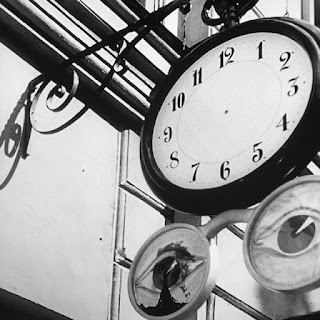Sleep, Perchance to Wake
I've seen the Bergman film Smultronstället [The Wild Strawberry Patch, known outside of Sweden as Wild Strawberries, 1957] maybe 12 times throughout my life — it's one of those pictures that I'm not sure if I've rewatched it regularly due to my enjoying it that much or due to my respecting it and always researching to discover its final touchstone quality that clearly has permeated the dermi of so many Bergman-heads.
It begins with the great Victor Sjöström (director of Kökarlen [The Coachman, aka The Phantom Carriage, 1921]) in the midst of sleep, a phenomenon found throughout cinema in opening scenes whereby one can project whatever they want by way of reality vs. fantasy in the proceedings that follow. The Professor Borg — Isak Borg ("I. B." as has perhaps been not too heavily conceived but too heavily remarked upon) —cherishes his solitude. His housekeeper Agda (Jullan Kindahl) serves as the professor's aide-de-camp — they have mutual feelings — it would be untoward for them ever to acknowledge let alone act upon them — she's his protector and reminder. Borg is set to receive an honorary award honoring his career, and it's Agda who guides him through the simple logistics of the day and evening of the bestowment. Borg drives to the ceremony — Agda will meet him there — his daughter-in-law Marianne played by Ingrid Thulin will accompany him — on the road he will stop off at his childhood estate and reveries of his childhood where he is nevertheless absent except through a point of view of the camera — he will reconcile the relationship between Ingrid Thulin and his son, Evald, played by Gunnar Björnstrand. That's the gist of the film.
This will not be a complicated analysis, due to my thoughts around the first paragraph, but I'll throw down some bulletpoints and will comment a bit if something strikes me.
• The dream. No hands on the clock, the busted balloon blank flatulent-face, the creak of the caught wheel, the baby crying. Bergman's anti-critics take great umbrage with this, because they search for symbolism where ultimately there is expressionism. It's very clear: 1 ≠ 1, rather let's say the baby crying accentuates and rhymes with death, a universal given especially as Borg will himself regress into his childhood and thoughts of Mama, and end up dealing with his son's fatuous back-turn on his wife, which immediately equates to, if not Isak Borg, then the other I. B. in personal struggle.
• In the revery: It is Uncle Aron's name-day. We Arizonas do not understand this but we get the idea. Sara is Bibi Andersson. Borg is awakened in the wild strawberry patch, by Andersson Mark 2; she is on her way with two friends (Anders and Viktor) to Italy. Isak reveals during the drive that Sara/Bibi Mark 1 actually did end up marrying the prick Sigfrid (Per Sjöstrand), and that they are now aged 75, and have six children.
• Borg dreams of Sara's baby, and of a classroom exam — he's caught in a between-space of child and elder, and his neuroses produce a dream teacher who intones to him: "You have been accused of guilt."
These are my notes on The Wild Strawberry Patch. They're nothing much, perhaps only because it's a film I feel either too close to, or too distant from. Nonetheless, it's anchored by its definitive position in the chronology of the Bergman œuvre. •
Other writing on Ingmar Bergman at Cinemasparagus:
Kris [Crisis, 1946]
Skepp till India Land [Ship to India, 1947]
Hamnstad [Port of Call, 1948]
Törst [Thirst, 1949]
Till glädje [To Joy, 1950]
Sommarlek [Summer Interlude, 1951]
Kvinnors väntan [Women's Waiting, 1952]
Sommaren med Monika [Summer with Monika, 1953]
Gycklarnas afton [Carnies' Twilight, aka Sawdust and Tinsel, 1954]
En lektion i kärlek [A Lesson in Love, 1954]
Kvinnodröm [Women's Dream, aka Dreams, 1955]
Sommernattens leende [Smile of the Summer Night, 1955]
Det sjunde inseglet [The Seventh Seal, 1957]
Smultronstället [The Wild Strawberry Patch, aka Wild Strawberries, 1957]






















No comments:
Post a Comment
Note: Only a member of this blog may post a comment.